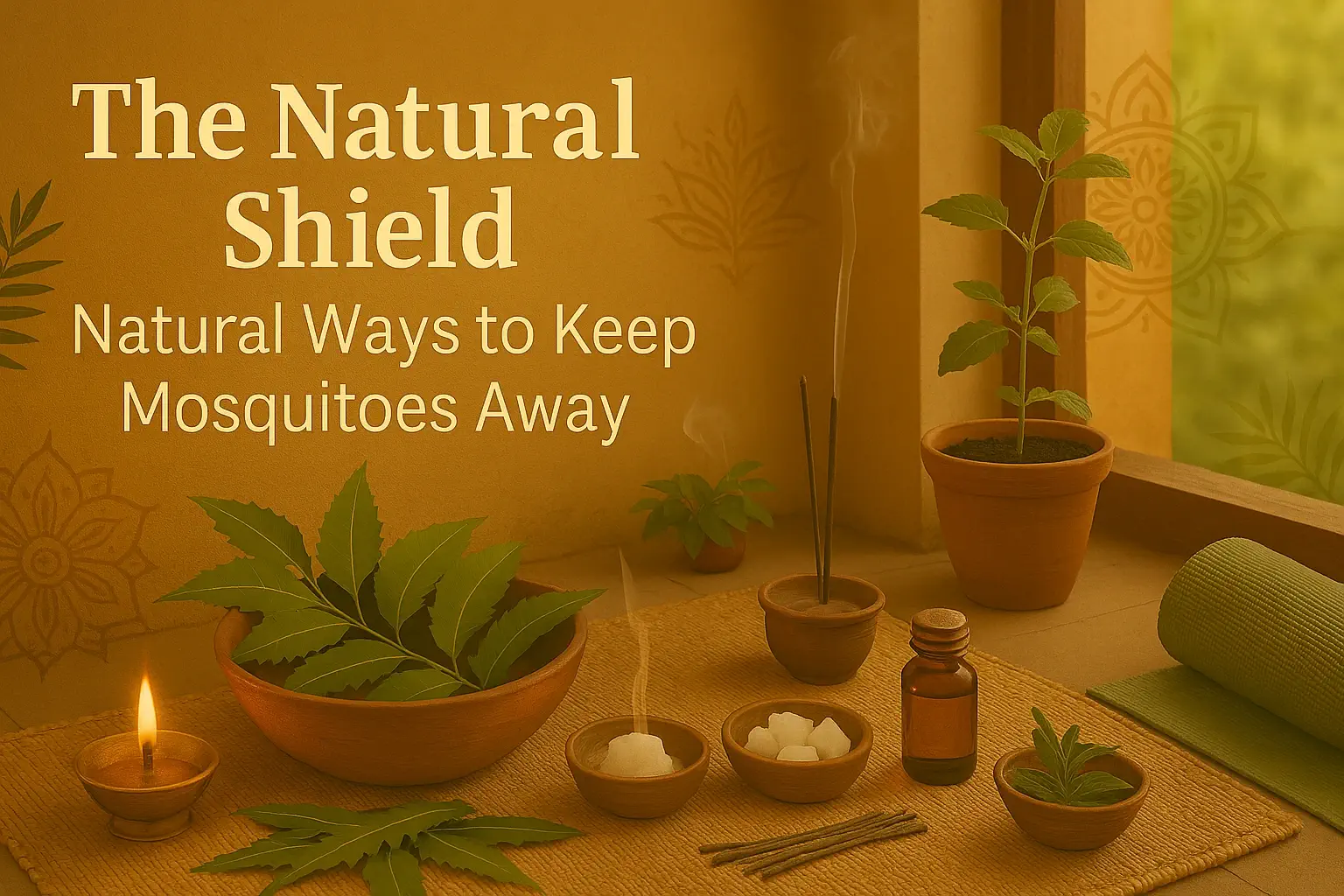There’s nothing quite like the calm after a good yoga session. You roll up your mat, sip some warm tulsi tea, and head out to your balcony or garden to soak in the evening breeze. Birds are chirping, the sky’s turning that soft orange-pink… and then—bzzzzzz! The tiny tormentors arrive.
If you’ve ever been ambushed by mosquitoes while trying to enjoy a peaceful evening, you’re not alone. Whether you’re in Bangalore, Boston, or British Columbia, these uninvited guests always seem to know the worst time to show up.
Now, I’m not one to reach for a chemical spray every time I hear a buzz. Like many of you, I prefer a more natural, balanced way of living. One that supports my health and the environment. That’s where the idea of a “natural shield” comes in—a gentle, plant-powered, DIY approach to mosquito control that works in harmony with your wellness routines.
In this blog, I’ll share simple, natural ways to repel mosquitoes at home—without harsh chemicals. Let’s reclaim our peaceful spaces and make our homes a sanctuary, inside and out.
Why Choose the Natural Path? Your Health, Your Home
Most of us have tried those chemical mosquito sprays at some point. You know the ones. They smell so strong you feel like you’ve walked into a science lab instead of your living room. And don’t even get me started on the sticky creams that feel like a layer of plastic on your skin.
Many store-bought repellents use DEET or other harsh chemicals. Sure, they might get the job done, but at what cost? Headaches, skin irritation, breathing issues—especially for kids, pets, or those with sensitive skin. Plus, they’re not exactly kind to the environment. One spray might not seem like a big deal, but imagine millions of people spraying those chemicals every day. Yikes.
That’s why more and more people—myself included—are turning to non-toxic mosquito repellent options. These are not only safer for our bodies, but they’re also gentle on the planet. Think of it as creating a cleaner, calmer bubble for your home. A bubble that still keeps mosquitoes at bay but doesn’t make you cough or wrinkle your nose.
As someone who grew up in a yoga-centric household, I learned early on that harmony matters. Not just in our bodies, but in the space around us. Choosing eco-friendly insect repellent methods is a small but powerful way to live with more awareness. And when your mosquito repellent is also a calming lavender spray or a pretty marigold plant? That’s a win-win.
With so many safe mosquito repellent choices now available, going natural isn’t just possible—it’s practical. And way more pleasant.
The Plant Powerhouse: Natural Mosquito Repellent Plants for Your Haven
🌿 Grow Your Own Green Guardians
Believe it or not, Mother Nature has her own squad of mosquito bouncers—and they don’t need batteries or chemicals. Many plants naturally release oils and scents that mosquitoes absolutely hate. For us? These same scents are often calming, refreshing, or even mouth-watering. It’s the ultimate win-win: a garden that smells amazing and keeps the bugs at bay.
I still remember my dadi (grandmother) crushing fresh tulsi leaves and placing them near the window in summer. “Machhar bhag jaayenge,” she’d say. And you know what? They often did. That was my first brush with plant-based mosquito control, long before I studied it formally in my yoga and naturopathy training.
So if you’ve got even a little balcony, terrace, or windowsill, these natural mosquito repellent plants can be your secret weapon.
🌱 Top Picks: Best Plants to Keep Mosquitoes Away
Let’s explore the real plant heroes and how to grow them at home.
1. Citronella Grass (Cymbopogon Nardus)
This one’s the classic. You’ve seen “citronella” on candles and sprays? It comes from this lemony grass.
- Why it works: The strong citrus scent confuses mosquitoes.
- How to use it: Crush a few blades and rub them on exposed skin (do a patch test first). Or plant it near entryways and garden seating areas.
- Care tips: Loves sunlight and well-drained soil. Keep it in a large pot if you want to move it indoors during colder months.
2. Lemon Eucalyptus (Eucalyptus Citriodora)
Not just beautiful—it’s a mosquito nightmare in disguise.
- Why it works: Contains PMD, a compound proven to repel mosquitoes.
- Fun fact: Even the CDC recommends it as a natural repellent ingredient.
- Care tips: Needs full sun and lots of space. Not ideal for tiny balconies, but great for backyard gardens.
3. Lavender (Lavandula)
A treat for your senses, and a terror for the bugs.
- Why it works: Its soothing floral scent masks the smells that attract mosquitoes.
- Extra bonus: Lavender oil helps you sleep better.
- Care tips: Loves dry, sunny spots. Use the dried flowers in sachets for indoor repellent.
4. Peppermint (Mentha Piperita)
Fresh, zingy, and totally underrated as a repellent.
- Why it works: Mosquitoes dislike its strong menthol scent.
- How to use: Rub fresh leaves on your skin (again, patch test!).
- Care tips: Grows like crazy. Best kept in pots to avoid a mint invasion.
5. Marigolds (Tagetes)
Bright, bold, and surprisingly powerful.
- Why it works: Contains pyrethrum, a natural insect repellent compound.
- Homey vibe: Common in Indian gardens and temple spaces.
- Care tips: Super easy to grow. Just give them sunlight and water.
6. Basil (Ocimum Basilicum)
Yes, your kitchen superstar is also a mosquito fighter.
- Why it works: Especially the lemon basil variety has strong insect-repelling oils.
- Multi-tasker: Use it in pasta and keep it on the windowsill.
- Care tips: Needs sun, regular watering, and a little trimming love.
7. Catnip (Nepeta Cataria)
Surprise! This one’s not just for cats.
- Why it works: Contains nepetalactone, which is 10x more effective than DEET in some studies.
- Heads up: Cats will love you if you grow it.
- Care tips: Thrives in partial sun, needs regular watering.
🌼 Strategic Planting for Outdoor Mosquito Control Natural
Here’s where the magic happens. To get the most out of your mosquito-fighting green buddies:
- Cluster the plants near doorways, windows, and outdoor seating spots.
- Create plant borders around patios or balconies.
- Hang herb baskets with peppermint and lavender near entry points.
- Mix and match: Combine citronella, basil, and marigold for a pretty and powerful combo.
If you’ve got a garden, this setup won’t just look beautiful—it’ll feel calmer and cleaner. And if you’re working with a small balcony or indoor setup, don’t worry. Even a few well-placed pots can help create your own little mosquito-free bubble.
Crafting Your Own Protection: DIY Mosquito Repellent & Sprays
🧪 The Magic of Essential Oils for Mosquitoes
Okay, let’s get into the fun part—mixing up your own natural mosquito repellent!
If you’ve ever opened a bottle of peppermint or lavender oil and taken a deep breath, you already know how powerful these essential oils can be. Now imagine that same lovely scent being strong enough to send mosquitoes packing. That’s the beauty of essential oils for mosquitoes.
These oils are concentrated plant extracts—pure, aromatic, and loaded with compounds that bugs absolutely loathe. And the best part? You’re in control of the scent, the strength, and the ingredients. No lab coats needed.
In my own routine, I always keep a small spray bottle in my bag during monsoon season in India. One quick spritz before stepping out, and I can walk through a park without being eaten alive. Bonus: people often ask what perfume I’m wearing!
🧴 Your Go-To Homemade Mosquito Spray Recipe
Let’s make your own DIY mosquito repellent—simple, effective, and smells amazing.
✅ Ingredients You’ll Need:
- Distilled water – ½ cup
- Witch hazel or rubbing alcohol – ½ cup
- Essential oils (choose 2–3):
- Citronella (10–15 drops)
- Lemon eucalyptus (10–15 drops)
- Lavender (10 drops)
- Peppermint (5–10 drops)
- A small spray bottle (preferably dark-colored glass for preserving the oils)
🛠️ Step-by-Step Instructions:
- Combine the witch hazel/rubbing alcohol and distilled water in your spray bottle.
- Add your essential oils. You can mix and match, but keep the total drops around 30–40.
- Shake well before every use.
- Spray on exposed skin or clothing before going outdoors.
It’s that easy. Just remember to do a patch test first—especially if you have sensitive skin.
🎨 Customizing Your Spray:
Want a calming spray before bed? Go heavier on lavender. Prefer something more energizing for your morning walk? Add more peppermint or lemon eucalyptus.
You can also make a version with coconut oil or jojoba oil instead of witch hazel if you prefer an oil-based roll-on repellent. Perfect for dabbing on wrists and ankles.
🌿 Beyond Sprays: Other DIY Natural Ways to Repel Mosquitoes at Home
Sprays are great—but they’re not the only option in your natural defense kit. Here are a few more homemade mosquito busters you can try.
🪻 Herbal Pouches
Create small cloth sachets filled with dried lavender, rosemary, peppermint, and cloves. Place them near windows, in cupboards, or under your pillow. They smell wonderful and keep bugs out.
🌬️ Diffusing Essential Oils
Add 5–6 drops of citronella, lemon eucalyptus, or tea tree oil to a diffuser. It fills your home with a fresh aroma while doubling as an invisible mosquito barrier.
🕯️ DIY Citronella Candles (With Caution)
If you enjoy crafts, you can make candles using soy wax and citronella oil. But if you’re not into DIY, natural citronella candles are easily available online. They’re perfect for outdoor dinners or yoga sessions in your backyard.
🧄 Garlic & Onion Repellents
An old village trick: cut a few garlic cloves and place them in corners or near doors. Some people swear by mixing garlic juice with water and spraying it around mosquito-prone areas. The smell fades fast, but it keeps pests away.
Holistic Defense: Outdoor Mosquito Control Natural & Beyond
💧 Eliminating Breeding Grounds: The First Line of Defense
Let’s start with the boring (but super important) stuff: don’t give mosquitoes a place to party.
Most mosquitoes lay eggs in standing water. And trust me, it doesn’t take much. A bottle cap full of water is enough for a whole mosquito family reunion.
If you want to create serious outdoor mosquito control natural results, do a weekly check of your surroundings:
- Empty saucers under flower pots.
- Change birdbath water every 2–3 days.
- Clean out clogged gutters (yes, even if you keep telling yourself you’ll do it “next weekend”).
- Check unused buckets, old tyres, tarpaulin sheets, and AC water trays.
- Cover water storage tanks tightly.
Growing up in India, my mom would make this a Sunday ritual—water the tulsi, check all corners for stagnant water, and light a lemongrass incense stick. It was her natural defense routine, and it worked surprisingly well.
🦇 Attracting Natural Predators
Want to turn your garden into a mosquito battlefield where you’re not the one getting bitten?
Let nature fight nature. Certain creatures love munching on mosquitoes:
- Bats: A single bat can eat hundreds of mosquitoes per hour!
- Dragonflies: They’re like fighter jets for your backyard.
- Birds: Swallows and purple martins are mosquito-loving heroes.
Add a small birdbath, plant wildflowers, or set up a bat house (yes, it’s a real thing!). These tiny allies are part of a larger eco-friendly insect repellent strategy that helps restore balance outdoors.
💡 Mindful Lighting Choices for Your Non-Toxic Mosquito Repellent Yard
Here’s a weird truth: mosquitoes are party crashers that love your lights.
White, blue, or bright LED lights attract them like a magnet. For a more non-toxic mosquito repellent for yard approach, switch to:
- Yellow bug lights
- Sodium lamps
- Warm-hued solar garden lights
Bonus: your evenings will feel softer, cozier, and way less buggy.
🌬️ Fan Power: Simple Air Movement
Mosquitoes are terrible fliers. They’re like that one cousin who trips over their own feet.
A basic pedestal fan or ceiling fan on your porch or balcony can make a huge difference. The breeze creates a current mosquitoes can’t fly against, which is surprisingly effective.
If you love doing outdoor yoga or sitting with a book under a tree, place a fan nearby and enjoy your natural mosquito-free zone.
🪟 Leveraging Natural Barriers
And let’s not forget the basics. Sometimes, simple old-school hacks are the best:
- Install mesh screens on windows and balcony doors.
- Use netting over beds (especially helpful if you like sleeping with windows open).
- Add climbing plants or trellises with citronella or basil to create natural, fragrant borders.
All these tactics create layers of plant-based mosquito control that are kind to the planet and to your skin.
Safety & Sustainability: Using Your Natural Shield Responsibly
Now that you’re armed with plants, sprays, and DIY tricks, let’s take a quick pause to talk about how to use them wisely. Natural doesn’t always mean risk-free. So let’s make sure your “natural shield” stays safe for you and your loved ones.
🧴 Patch Test First
Before applying any natural mosquito repellent or essential oil mix on your skin, always do a patch test. Dab a little on the inside of your elbow and wait 24 hours. If there’s redness, itching, or irritation—skip it or dilute further.
💧 Dilution Matters
Essential oils are powerful. A few drops go a long way. Always mix them with a carrier (like coconut oil, witch hazel, or water). Undiluted oils can burn or irritate sensitive skin.
🚫 Not for Ingestion
Even if it smells amazing, don’t eat it. These repellents—sprays, candles, pouches—are for external use only. That includes pets too! Keep things like garlic-based repellents out of your dog’s snack zone.
🔁 Continuous Effort
Natural methods usually don’t last all day with one application. Reapply sprays every few hours, refresh herbal pouches weekly, and maintain plant health regularly.
🧘♂️ Consult an Expert
If you have allergies, skin sensitivities, or health conditions, it’s smart to check with a general wellness expert or naturopath before trying anything new.
🌱 A Sustainable Approach
By choosing safe mosquito repellent options, you’re protecting not just yourself but also your local ecosystem. Small changes can create a big ripple—like a yoga practice, it’s all about consistency.
Conclusion: Living Harmoniously with Nature
Mosquitoes may be small, but they sure know how to mess with your peace. The good news? You don’t need to reach for chemical sprays to fight back. Nature’s already given us the tools—we just need to use them.
From growing fragrant herbs to whipping up your own natural mosquito repellent, every small step helps you reclaim your space. These natural ways to repel mosquitoes at home aren’t just about avoiding bites—they’re about creating a lifestyle that’s calm, clean, and connected to the earth.
As someone who grew up steeped in yoga and natural living, I’ve found that the simplest routines—like planting marigolds or diffusing lavender oil—can have the biggest impact.So go on, build your “natural shield.” Whether you’re meditating at dawn or sipping chai at dusk, you deserve to enjoy every moment—buzz-free.
🙋♀️ FAQs: Natural Mosquito Repellent
What smells do mosquitoes hate the most?
Mosquitoes really dislike strong scents like citronella, peppermint, lemon eucalyptus, lavender, and garlic. These smells confuse their senses and keep them from landing on you. Using essential oils or plants with these scents is a great natural way to repel them.
Do natural mosquito repellents actually work?
Yes, when used properly! Natural mosquito repellents like essential oil sprays, mosquito-repelling plants, and herbal pouches can be very effective—especially when used consistently. They may need more frequent application than chemical sprays, but they’re safer for your skin and home.
What is the best plant to keep mosquitoes away?
Citronella grass is one of the most effective plants for repelling mosquitoes. Others like lavender, marigold, basil, and peppermint also work well. For best results, place them near entryways, balconies, or outdoor seating areas.
How can I make my own mosquito repellent spray at home?
Mix distilled water, witch hazel (or rubbing alcohol), and essential oils like citronella, lemon eucalyptus, and lavender. Shake it up in a spray bottle and apply it to exposed skin. Always do a patch test before using it regularly.
What are the safest mosquito repellents for kids and pets?
Natural repellents made from diluted essential oils like lavender or lemon eucalyptus are generally safer—but always check for age-appropriate oils and consult a pediatrician or vet. Avoid products with DEET for young children or pets.




